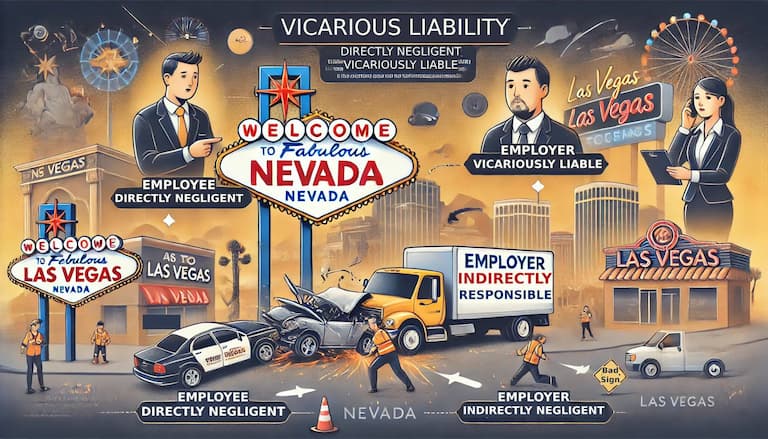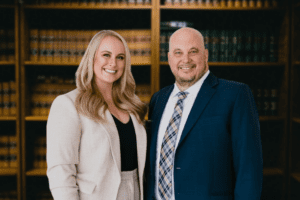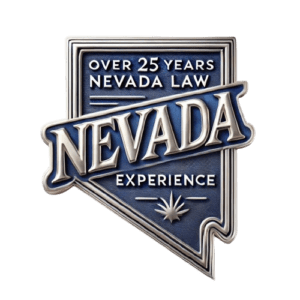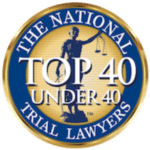Las Vegas Personal Injury Lawyer Explains How Nevada's Vicarious Liability Laws May Affect Your Claim

Liability
In Nevada, liability refers to the legal obligation of a person or entity to compensate for harm or damages caused by their actions, negligence, or failure to act responsibly.

When you’re involved in an accident in Las Vegas, determining who is legally responsible or “liable” isn’t always straightforward. However, liability isn’t always limited to the person who directly caused the harm. In some cases, the person who directly caused your injury may not be the only party liable. This is where vicarious liability comes into play.
What Is Vicarious Liability?
Vicarious liability is a legal principle that holds one party responsible for the actions of another. In Nevada, this often means an employer can be held liable for the negligent actions of their employee if those actions occurred within the scope of employment. This concept is crucial in personal injury cases, especially in a bustling city like Las Vegas where businesses operate around the clock.
Common Examples of Vicarious Liability in Las Vegas
- Taxi and Rideshare Accidents
Las Vegas streets are filled with taxis and rideshare vehicles like Uber and Lyft. If a driver causes an accident while on the job, the employing company may be held vicariously liable for your injuries. - Hotel and Casino Employee Negligence
With the multitude of hotels and casinos on the Las Vegas Strip, incidents involving staff negligence are not uncommon. For example, if a hotel housekeeping employee leaves a hazard that leads to a slip and fall accident, the hotel could be held responsible. - Delivery and Commercial Vehicle Accidents
Delivery trucks and commercial vehicles are frequent sights in Nevada. If a commercial driver causes an accident while making deliveries, their employer may share liability.
How Nevada Law Applies Vicarious Liability
Under Nevada law, vicarious liability holds one party legally accountable for another’s actions in specific situations. This doctrine often applies in personal injury and accident cases, where the “vicariously liable” party typically has greater resources and insurance coverage than the individual directly responsible.
Vicarious Liability scenarios include:
Employer-Employee Relationship: Under Nevada Revised Statutes, NRS 41.745 – Liability of employer for intentional conduct of employee – employers are liable for the actions of their employees performed within the scope of employment. Factors that courts consider include:
- Employee’s Job Duties: Was the employee performing their assigned tasks?
- Time and Place: Did the incident occur during working hours and at the workplace or designated area?
- Intent: Was the employee acting with the intent to benefit the employer?
Parent-Child Liability: Parents may be liable for their child’s actions, such as permitting the use of a firearm, if the child’s negligent or intentional misconduct causes harm.
Family Purpose Doctrine: Vehicle owners can be held liable for damages caused by the negligent or intentional actions of an immediate family member operating the vehicle.
Loaning a Vehicle: Individuals may be liable for damages if they negligently loan their vehicle to an unfit or unsafe driver.
Why Vicarious Liability Matters in Your Personal Injury Claim
- Increased Compensation Potential: Employers often have larger insurance policies than individual employees, increasing the likelihood of full compensation for your injuries.
- Holding All Parties Accountable: It ensures that all responsible parties are held liable, promoting safer business practices in Las Vegas.
- Legal Expertise Required: Navigating vicarious liability claims can be complex, requiring the expertise of a seasoned Nevada personal injury lawyer.
Challenges in Proving Vicarious Liability
- Independent Contractors vs. Employees: Employers may argue that the negligent party was an independent contractor, not an employee.
- Scope of Employment: Disputes may arise over whether the employee was acting within their job duties.
- Intentional Acts: Employers are generally not liable for employees’ intentional misconduct unless it was foreseeable and related to their employment.
Case Study: Vicarious Liability in a Las Vegas Casino
If a security guard at a Las Vegas casino uses excessive force while removing a guest, resulting in injury, the guard is directly responsible for their actions.
However, the casino may be held vicariously liable under Nevada law if the guard was acting within the scope of employment, such as maintaining order.
The casino could also face direct liability for negligent hiring, training, or supervision if its own actions contributed to the harm. This ensures injured parties can pursue compensation from the employer, who typically has greater resources and insurance coverage.
How a Las Vegas Personal Injury Lawyer Can Help
- Investigating the Claim: We gather evidence to establish the employer-employee relationship and the scope of employment.
- Negotiating with Insurance Companies: Employers’ insurers may aggressively defend against vicarious liability claims. Our firm has the experience to negotiate effectively on your behalf.
- Litigation Support: If necessary, we are prepared to take your case to court to secure the compensation you deserve.
Local Expertise Matters
With over 25 years of experience serving the Las Vegas community, Kevin R. Hansen understands the nuances of Nevada’s vicarious liability laws. Our firm’s deep roots in Las Vegas enable us to provide personalized legal representation tailored to the local landscape.
Frequently Asked Questions
Q1: Can I sue the employer directly in a vicarious liability case?
A: Yes, you can file a claim against both the employee and the employer. In many cases, it’s strategic to include the employer due to their larger insurance coverage.
Q2: What if the employee was off-duty but using a company vehicle?
A: Determining liability in such cases can be complex. Factors include whether the employee had permission to use the vehicle and the purpose of its use at the time of the accident.
Get Legal Advice Now
Understanding vicarious liability is essential for maximizing compensation in a personal injury claim in a Las Vegas casino. It can significantly affect the outcome of your case and the compensation you receive.
If you believe that more than one party may be responsible for your injuries, it’s crucial to consult with an experienced Las Vegas personal injury attorney with decades of experience.

Hansen and Harmon
Legal Team at the Law Office of Kevin R. Hansen
The legal team of Hansen and Harmon have decades of experience in personal injury law. We are committed to delivering personalized, aggressive representation for every client in Las Vegas.

Legal Questions?
702-478-7777






